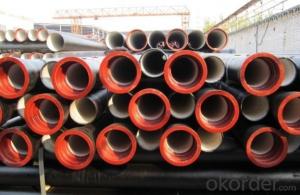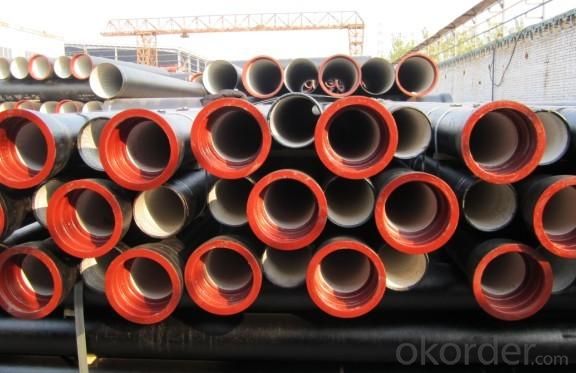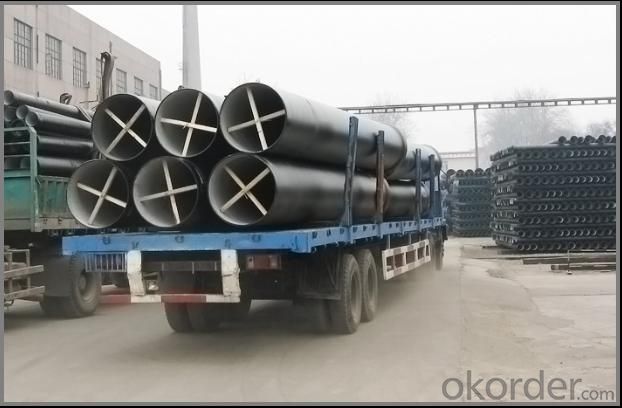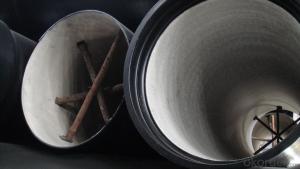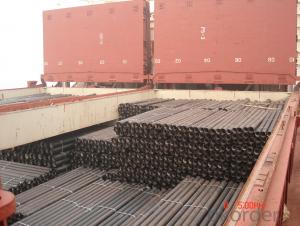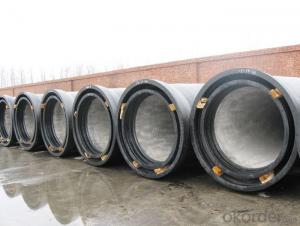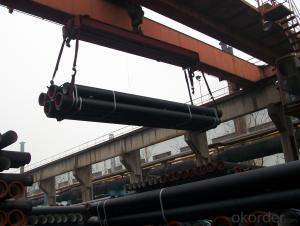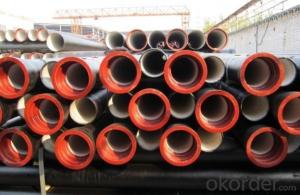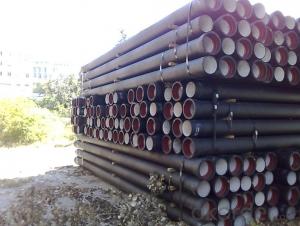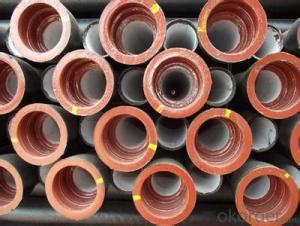Ductile Iron Pipe ISO2531:1998 DN100-DN1000
- Loading Port:
- China main port
- Payment Terms:
- TT or LC
- Min Order Qty:
- 20 m.t.
- Supply Capability:
- 200000 m.t./month
OKorder Service Pledge
OKorder Financial Service
You Might Also Like
1,Ductile Iron Pipe Description :
DI pipe fittings are manufactured according to ISO 2531 or BS EN545 or BS4772 FOR POTABLE WATER ,internal is cement lining or wet epoxy coating;External is zinc plus bitumen or wet epoxy coating. We also manufacture ductile iron fittings with fusion bonded epoxy both inside and outside. All the producets are sutible to water pipes fields.We have passed ISO9001,ISO14001,OHSMS18001 certificate.
Pipes confirm to ISO2531,K9 class,T type joint,6m long,with inside cements lining conform to ISO4179, outside Zinc spraying(130g/m2) and bitumen coating(70μm) conform to ISO8179.
Pipe ends: Spigot and socket ends, with 100% SBR rubber gaskets accoding to ISO4633.we can do third party inspection according to customer's request.
2,Main Features of the Ductile Iron Pipe:
1).Quality guarantee
• Chemical checking
• NDE after rough machining
• Mechanical testing after heat treatment
• Final NDE,dimension inspected
2).Quality document
• Full Q.A document as per client request
3).Packing and Shipping
• standard export package(carton/wooden case/pallet)
• accept FOB,FAS,CNF,CIF door to door etc or customer designated shipping agent
4).Service
• Drawing: we can translate your original drawing, offer best suggestion on design
• Quality: we have full set quality control system to guarantee the best quality.
• Inspection: inspect in house, all our products must be checked 3 times before packing
3,Ductile Iron Pipe Images:
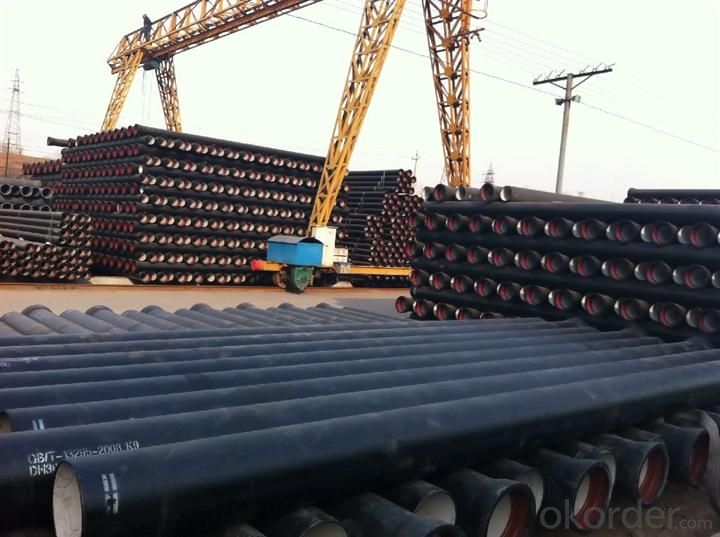
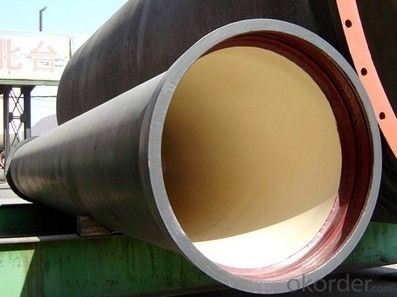
4.FAQ:
We have organized several common questions for our clients,may help you sincerely
Q: Why would you choose ductile iron pipe rather than other pipe materials?
A:The reasons are obvious for that not only ductile iron pipe possesses the inherent strength and flexibility of ductile iron, combined with proven corrosion protection systems, but also the cost savings can be achieved from design to installation and commissioning.
Q:Why can you guarantee the inner of pipes can’t be corroded?
A: High alumina cement mortar lining and sulphate-resistant cement mortar lining. These two special linings are applicable to inner anti-corrosion for sewage pipes, improving resistance to erosion of the sewage components.
- Q: Will the cast iron pipes rust?
- Qualified ductile iron pipe requires lining standard cement. The outer wall of pipe needs spraying zinc treatment and asphalt paint coating, and other epoxy resin paint can also be selected.
- Q: Can ductile iron pipes be used for underground slurry pipelines?
- Yes, ductile iron pipes can be used for underground slurry pipelines. Ductile iron pipes are known for their strength and durability, making them suitable for transporting various types of slurries underground.
- Q: What are the different pressure classes available for ductile iron pipes?
- There are several pressure classes available for ductile iron pipes, which are typically used for water and wastewater applications. The most common pressure classes for ductile iron pipes include Class 150, Class 200, Class 250, Class 300, and Class 350. These pressure classes indicate the maximum working pressure that the pipe can withstand in pounds per square inch (psi). Class 150 ductile iron pipes have a maximum working pressure of 150 psi, while Class 200 pipes can handle up to 200 psi. Class 250 pipes can withstand pressures up to 250 psi, and Class 300 pipes have a maximum working pressure of 300 psi. The highest pressure class, Class 350, can handle pressures up to 350 psi. The selection of the appropriate pressure class for a ductile iron pipe depends on various factors such as the system design, fluid characteristics, and operating conditions. It is important to consult the relevant standards and guidelines, such as the American Water Works Association (AWWA) standards, to determine the appropriate pressure class for a specific application. It is worth noting that these pressure classes refer to the working pressure of the pipe, which is the pressure the pipe is designed to safely contain during normal operation. The pipes are typically tested and certified to ensure they meet the required pressure class standards.
- Q: Are ductile iron pipes suitable for use in hydropower projects?
- Yes, ductile iron pipes are suitable for use in hydropower projects. Ductile iron pipes have a high tensile strength and are resistant to corrosion, making them ideal for applications in hydropower projects where water flow and pressure are involved. They are capable of withstanding high pressure and are durable, ensuring long-term reliability and safety in hydropower systems. Additionally, ductile iron pipes are cost-effective compared to other materials like steel, making them a popular choice for hydropower projects. Overall, ductile iron pipes offer the necessary characteristics and performance qualities required for the demanding conditions of hydropower projects.
- Q: Are ductile iron pipes resistant to chloride-induced corrosion?
- Yes, ductile iron pipes are resistant to chloride-induced corrosion. Ductile iron is a type of cast iron that has been treated with magnesium to make it more flexible and resistant to cracking. It has a ferritic microstructure which provides excellent resistance to corrosion caused by chlorides. Chloride-induced corrosion can occur when chloride ions in the water or soil come into contact with the metal surface, leading to the formation of corrosion products such as rust. However, the presence of magnesium in ductile iron forms a protective layer on the surface, preventing the chloride ions from reaching the metal and thus inhibiting corrosion. This makes ductile iron pipes suitable for a wide range of applications, including water supply and sewerage systems, where chloride exposure is common.
- Q: How do ductile iron pipes perform in earthquake-induced ground movements?
- Ductile iron pipes perform well in earthquake-induced ground movements due to their inherent strength and flexibility. The material's ductility allows it to withstand ground shaking, ground settlement, and other dynamic forces during an earthquake. This flexibility helps prevent the pipes from fracturing or bursting, minimizing the risk of water or sewage leaks. Additionally, ductile iron pipes are designed to accommodate ground movements by using joints that can expand and contract, ensuring their stability and preventing damage.
- Q: Can ductile iron pipes be used for underground chemical transport systems?
- Due to their strength, durability, and resistance to corrosion, ductile iron pipes are commonly utilized in a variety of applications. However, when considering their use in underground chemical transport systems, it is crucial to take certain factors into account. Firstly, it is necessary to evaluate the type of chemicals being transported. Although ductile iron pipes are generally resistant to a wide range of chemicals, including acids, alkalis, and organic solvents, there are some chemicals that can cause corrosion or react with the iron content of the pipes, leading to degradation and potential leakage. Therefore, it is essential to assess chemical compatibility and seek advice from chemical engineers or experts to determine if ductile iron pipes are suitable for specific chemical transport applications. Secondly, the concentration and temperature of the chemicals must be considered. Elevated temperatures and high concentrations of certain chemicals can accelerate the corrosion process, potentially compromising the integrity of the pipes. Therefore, it is crucial to evaluate the operating conditions and ensure that the ductile iron pipes can withstand the chemical concentration and temperature levels. Furthermore, the potential presence of abrasive or erosive chemicals needs to be taken into consideration. If the transported chemicals contain abrasive particles or possess erosive properties, it may cause increased wear and tear on the inner surface of the pipes, reducing their lifespan and potentially leading to leaks. In such cases, it may be more appropriate to use alternative materials with higher resistance to abrasion or erosion. Lastly, it is important to adhere to relevant regulations and standards. Different countries or regions may have specific requirements for underground chemical transport systems, including the selection of materials. Therefore, it is crucial to ensure that ductile iron pipes meet the necessary standards and are approved for use in such applications. In conclusion, while ductile iron pipes have many desirable properties for various applications, including underground use, their suitability for chemical transport systems is dependent on several factors. Before deciding to use ductile iron pipes for underground chemical transport systems, it is essential to carefully evaluate chemical compatibility, concentration and temperature levels, the presence of abrasive or erosive chemicals, and compliance with regulations. Seeking guidance from experts in the field is highly recommended to ensure the safety and effectiveness of the chosen piping material.
- Q: How do ductile iron pipes perform in freeze-thaw cycles?
- Ductile iron pipes demonstrate exceptional performance in freeze-thaw cycles due to their material properties. With high tensile strength and excellent impact resistance, ductile iron is highly resistant to the stresses caused by freezing and thawing. Unlike other materials, these pipes can withstand the expansion and contraction during temperature changes without cracking or breaking. One of the primary reasons for the success of ductile iron pipes in freeze-thaw conditions is their capacity to absorb and dissipate stresses. The material's high ductility allows for slight deformation under stress, releasing pressure and preventing pipe damage. This characteristic ensures that the pipes can endure repeated freezing and thawing cycles without compromising their structural integrity. Furthermore, ductile iron pipes feature a durable and protective coating, such as cement mortar lining or polyethylene encasement, which further enhances their resistance to freeze-thaw cycles. These coatings offer an extra layer of protection, preventing direct contact between water and the iron and reducing the risk of corrosion. Moreover, ductile iron pipes have an extended service life, often exceeding 100 years, thanks to their inherent strength and resistance to various environmental factors, including freeze-thaw cycles. The pipes' ability to endure these cycles without significant damage ensures the reliability and durability of water distribution systems, even in regions prone to freezing temperatures. In conclusion, ductile iron pipes are highly dependable and excel in freeze-thaw cycles. Their high tensile strength, impact resistance, capacity to absorb stresses, and protective coatings make them the preferred choice for water distribution systems in areas with harsh winter conditions.
- Q: Are ductile iron pipes suitable for use in oil refineries?
- Yes, ductile iron pipes are suitable for use in oil refineries. Ductile iron is a type of cast iron that offers a unique combination of strength, durability, and flexibility, making it an excellent choice for various applications, including oil refineries. One of the key advantages of ductile iron pipes is their high tensile strength, allowing them to withstand the high pressure and stress commonly found in oil refining processes. This strength is crucial for the transportation of various fluids, including crude oil, refined petroleum products, and chemicals within the refinery. Additionally, ductile iron pipes have excellent corrosion resistance properties, making them highly resistant to the corrosive effects of oil, chemicals, and other substances typically present in oil refineries. This corrosion resistance ensures the longevity and reliability of the pipes, reducing the need for frequent maintenance and replacement. Furthermore, ductile iron pipes have exceptional ductility, which means they can absorb and withstand significant impacts and vibrations without fracturing or breaking. This quality is advantageous in oil refineries where there may be frequent movement or potential stressors due to machinery, equipment, or ground settlement. Moreover, ductile iron pipes have a smooth interior surface that reduces friction, allowing for efficient fluid flow and minimizing pressure loss. This characteristic is essential in oil refineries, as it helps optimize the transportation of fluids, ensuring a smooth and reliable production process. In conclusion, ductile iron pipes are suitable for use in oil refineries due to their high tensile strength, corrosion resistance, ductility, and smooth interior surface. These pipes provide a reliable and durable solution for transporting various fluids within the refinery, contributing to the efficient and safe operation of oil refining processes.
- Q: Can ductile iron pipes be used for underground cooling water systems?
- Yes, ductile iron pipes can be used for underground cooling water systems. Ductile iron is known for its strength, durability, and corrosion resistance, making it suitable for various applications, including underground installations. It can withstand the pressure and temperature requirements of cooling water systems, providing a reliable and long-lasting solution.
Send your message to us
Ductile Iron Pipe ISO2531:1998 DN100-DN1000
- Loading Port:
- China main port
- Payment Terms:
- TT or LC
- Min Order Qty:
- 20 m.t.
- Supply Capability:
- 200000 m.t./month
OKorder Service Pledge
OKorder Financial Service
Similar products
Hot products
Hot Searches
Related keywords
